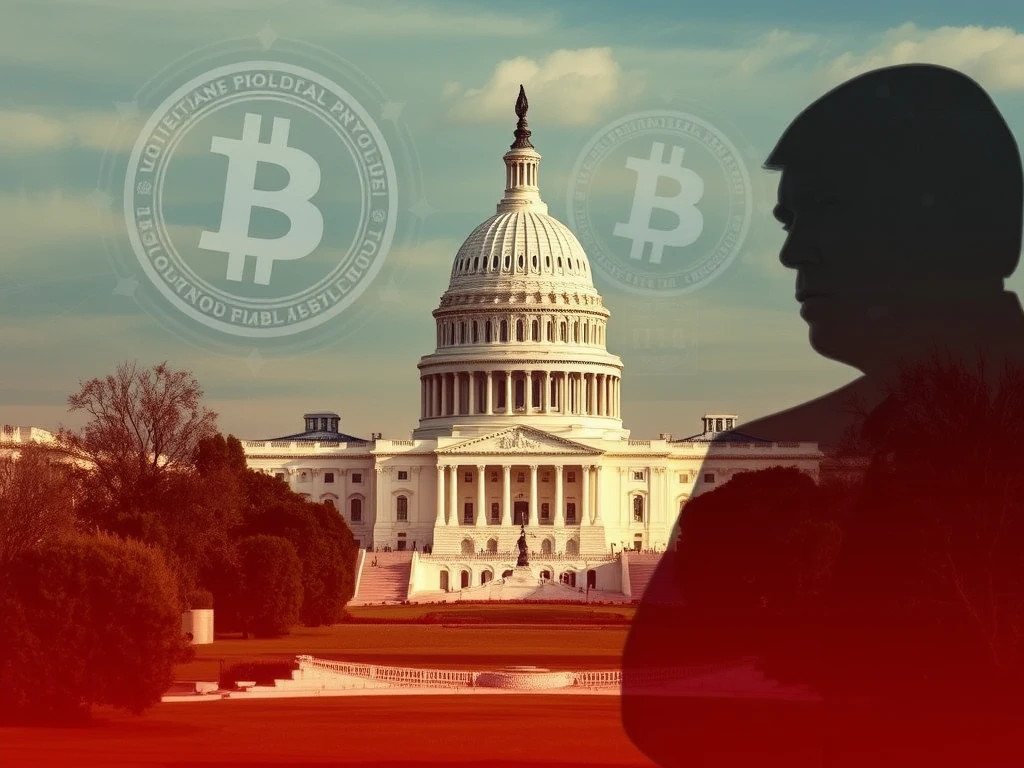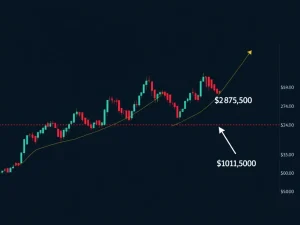Explosive Trump Crypto Ties Threaten US Digital Assets Regulation

The path to clear US crypto legislation is getting complicated, shadowed by questions surrounding former President Donald Trump’s growing involvement with the digital asset space. These Trump crypto ties are creating significant friction in congressional debates, potentially hindering efforts to establish clear rules for the industry.
How Trump’s Crypto Ties Impact Legislation Debate
Members of the US House Financial Services Committee and the House Agriculture Committee recently convened hearings to discuss frameworks for digital assets. However, a recurring concern emerged: the potential for former President Trump to use his position or influence to profit from the crypto industry.
Representative Maxine Waters, ranking member of the House Financial Services Committee, expressed worry that without specific language in proposed bills, Trump could exploit new structures to benefit financially. She cited instances like Trump hosting a dinner for memecoin holders, reportedly involving significant payments, and suggested he could potentially direct funds into his own digital wallet using market structures.
Other lawmakers echoed these concerns. Former CFTC Chair Timothy Massad described Trump’s crypto activities as a ‘taint’ on the industry, raising national security questions. He questioned whether actions might be taken for personal enrichment rather than national interest. Representative Angie Craig highlighted that Trump’s involvement makes passing crypto legislation ‘a lot more difficult,’ noting the potential for using non-public information.
The CLARITY Act and Concerns Over Digital Assets Regulation
One piece of legislation under review is the Digital Asset Market Clarity (CLARITY) Act in the House. Introduced as a bipartisan effort to create ‘rules of the road,’ the bill aims to provide clarity on jurisdictional boundaries between regulators like the SEC and CFTC, which Chair French Hill noted is currently lacking and discourages innovation.
Despite its stated goals, the CLARITY Act faces strong criticism, particularly from Representative Waters. She called the bill ‘rushed’ and ‘overly complicated,’ arguing it could increase investor harm. Waters pointed out that the bill might exempt some risky activities, leaving constituents vulnerable if their investments vanish. She also contended it risks national security and lacks penalties for criminals.
The debate over the CLARITY Act highlights the broader challenge of establishing effective digital assets regulation that protects consumers and national interests while fostering innovation. The political backdrop, influenced by questions about Trump’s crypto interests, adds another layer of complexity to this already difficult task.
National Security and Investor Harm Risks Raised in Congress Crypto Hearings
Beyond the specifics of the CLARITY Act, lawmakers in various Congress crypto hearings have voiced fundamental concerns about the rapidly evolving digital asset landscape, exacerbated by the political context.
Key risks discussed include:
- Investor Harm: Concerns that complex or unregulated crypto products can lead to significant financial losses for individuals, with limited recourse.
- National Security: Worries that unclear regulations or political influence could create vulnerabilities or allow illicit activities within the digital asset ecosystem.
- Lack of Clarity: The ongoing uncertainty regarding which assets fall under SEC or CFTC jurisdiction leaves both investors and businesses in limbo.
In response to these issues and the perceived conflicts of interest, Representative Waters introduced separate legislation in May. This bill specifically aims to prohibit the president, vice president, members of Congress, and their immediate families from engaging in the crypto industry, directly addressing the concerns raised by Trump’s activities.
What’s Next for US Crypto Law?
The legislative path forward for US crypto law remains uncertain. Bills like the CLARITY Act in the House and the GENIUS Act (Guiding and Establishing National Innovation for US Stablecoins) in the Senate are navigating complex political currents.
While the GENIUS Act, focused on regulating stablecoins, recently passed a key vote allowing it to move forward, the CLARITY Act and other market structure proposals face continued pushback. The scrutiny over Trump crypto ties provides leverage for lawmakers who are hesitant to pass legislation they believe could be exploited or is otherwise insufficient in protecting the public and national security.
The debate underscores the significant challenge Congress faces in crafting effective digital asset regulation. The political spotlight on former President Trump’s activities in the crypto space is undeniably clouding the legislative process, making consensus harder to achieve and potentially delaying the clarity the industry seeks.









